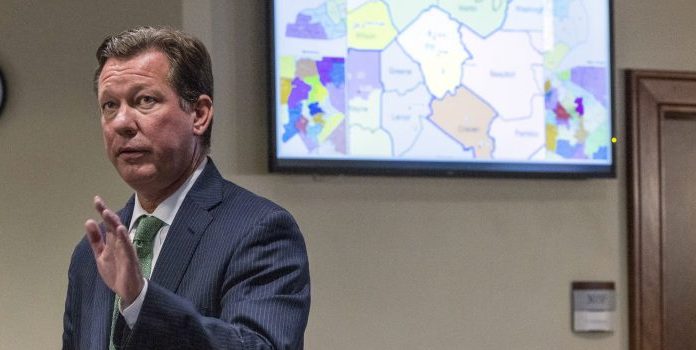(Robert Jonathan, Headline USA) The corporate media is portraying the U.S. Supreme Court decision in the North Carolina redistricting case as a big defeat for the GOP.
However, the court’s decision on Tuesday to affirm the relatively recent authority of state courts to review legislative redistricting maps and, if necessary, force them to be redrawn, may, in fact, be more nuanced.
The full ramifications of the Moore v. Harper decision are yet to play out, but it could prompt more courthouse activity in 2024 and beyond that might cut both ways—although radical Democrats are much more adept at engaging in lawfare.
As Chief Justice John Roberts wrote for the majority in the 6-3 decision, which included the court’s three leftists and its three centrists, the issues in the case “are complex and context specific,” which is hardly a recipe for clarity.
Sometimes the only real winners in this kind of scenario are the lawyers and their billable hours. Moreover, Roberts is known for trying to achieve a consensus on the high court across ideological lines, the downside of which is narrow or vague decision-making.
“Americans hoping for a clear ruling that would reduce disruptive litigation ahead of the next election will be disappointed,” the nonpartisan Honest Elections Project said in statement about the decision.
“But in the final analysis, Moore v Harper may wind up being a crucial buffer against the Left’s endless campaign to get courts to rewrite election laws for partisan gain.”
The case found its way to the high court after the-then Democrat-controlled North Carolina Supreme Court tossed out the congressional map created by the GOP-controlled legislature because of what the state justices deemed partisan gerrymandering.
Republican officials appealed the ruling to the Supreme Court.
In short, the North Carolina case revolved around whether state courts can second-guess politicians, i.e., nullify redistricting maps created by North Carolina’s General Assembly, particularly given the U.S. Constitution’s Election Clause.
That clause, Article 1, Section 4, of the Constitution reads that “The Times, Places and Manner of Holding Elections for Senators and Representatives shall be prescribed in each State by the Legislature thereof…”
In the run-up to this week’s decision, the left was hyperventilating that the conservative Supreme Court was ready to adopt the so-called independent state legislature theory as a power grab.
“The Elections Clause does not insulate state legislatures from the ordinary exercise of state judicial review,” Roberts declared in legalese, however, more than implying that the courts do have a role to play.
In analyzing the outcome of Moore v. Harper, “a majority of the justices rejected the idea that the independent state legislature theory gives state legislatures broad power over federal elections, without any role for state courts in supervising the exercise of that power,” the SCOTUS Blog summarized.
In the decision, Roberts went on to write that “In sum, our precedents have long rejected the view that legislative action under the Elections Clause is purely federal in character, governed only by restraints found in the Federal Constitution…”
That authority at the state court level is not open-ended, Roberts also seemed to suggest in a somewhat contradictory passage, but at the same time, federal courts could also jump into these disputes.
“State courts retain the authority to apply state constitutional restraints when legislatures act under the power conferred upon them by the Elections Clause,” Roberts’ opinion asserted.
“But federal courts must not abandon their own duty to exercise judicial review. In interpreting state law in this area, state courts may not so exceed the bounds of ordinary judicial review as to unconstitutionally intrude upon the role specifically reserved to state legislatures.”
As a practical matter, this could further muddy the waters in certain circumstances, resulting in more legal wrangling in court between Democrat and Republican attorneys.
Influential constitutional law scholar Jonathan Turley quipped about the left’s dire warnings, “Nothing fuels election fundraising like abject fear…In fairness to some of the less bombastic critics, the acceptance of the independent state legislature theory would have produced a radical change in how elections are handled in the United States.”
The George Washington University law professor added that “the independent state legislature theory was based on a good-faith but clearly minority view” of an interpretation of the Election Clause language.
In dissent, Justice Clarence Thomas pointed out, among other things, that the controversy was moot and should not have led to his colleagues rendering a decision in the first place.
He also described the Roberts ruling as merely “advisory” in nature.
After the 2022 elections, Republicans gained control of the North Carolina Supreme Court, which overturned the earlier decision.
“Some legal experts said Tuesday’s decision gives federal courts, including the Supreme Court, a bigger role to play in second-guessing state actions on election law, with few guidelines,” the Washington Post reported about the decision that otherwise won praise from Democrats and civil rights groups.
According to Roberts, when it comes to federal election law, “state courts may not transgress the ordinary bounds of judicial review.”
The North Carolina legislature, which is starting from scratch in drawing up new district boundaries, remains in GOP hands.
The ruling limits “state courts’ ability to wrest control of elections law from state legislatures,” The Federalist noted.
“The ruling does not, however, entirely stymie activist attempts to use courts to override elected legislators’ decisions about election law,” the news outlet cautioned.

